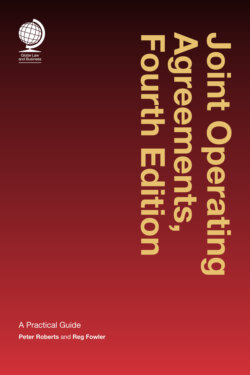Читать книгу Joint Operating Agreements - Peter Roberts - Страница 4
На сайте Литреса книга снята с продажи.
ОглавлениеTable of contents
Introduction
Glossary
1.First principles of the JOA
1.1 The logic for a joint venture
1.2 The concept of the JOA
1.3 The incorporated joint venture
1.4 Hybrid project structures
1.5 Partnership contrasted
1.6 Pre-JOA agreements
1.7 Model form contracts
1.8 JOA evolution and economics
2.Concession forms and the JOA relationship
2.1 Introduction
2.2 Applicable terms
2.3 Operator rights and duties
2.4 State participation in the joint venture
2.5 Liability
2.6 Disposal of petroleum
2.7 Property and ownership
2.8 Decommissioning
2.9 Information and confidentiality
2.10 Dispute resolution
2.11 Exclusive operations and non-consent
3.Parties, participating and carried interests and collateral support
3.1 The parties
3.2 Participating and carried interests
3.3 Collateral support
3.4 Joint property
4.Managing state participation
4.1 State participation in the concession and JOA
4.2 Later state participation
4.3 Carried interests
5.Duration
5.1 Pre-JOA arrangements
5.2 Commencement
5.3 Term
5.4 Termination and surrender
5.5 Surviving provisions
6.Scope
6.1 Joint operations
6.2 Excluded activities
6.3 Expanding the scope
6.4 Definition of the scope
6.5 Modification of the scope
7.The operator
7.1 The operator’s advantage
7.2 Selection of the operator
7.3 The role of the operator
7.4 The locus of the operator
7.5 Resignation and removal
7.6 Hybrid operator structures
7.7 The operator’s perspectives
7.8 Fiduciary duties and relational contracts
8.The non-operating parties
8.1 The role of the operating committee
8.2 Operating committee mechanics
8.3 Subcommittees
8.4 Voting control
8.5 The non-operating parties’ perspective
9.The accounting procedure
9.1 Model form accounting procedures
9.2 Accounting principles
9.3 Contents of the accounting procedure
9.4 Accounting procedure issues
10.Economic management
10.1 Introduction
10.2 Work programmes and budgets
10.3 Authorities for expenditure
10.4 Cashcalls and invoice requests
10.5 Payment obligations
10.6 Dealing with default
11.Contracting
11.1 Procurement options
11.2 Third-party contracts
11.3 Affiliate contracts
11.4 Federal contracts
11.5 Contributions in kind
11.6 Awarding of contracts
11.7 Contract management, audit and ABC compliance
12.Petroleum management and disposal
12.1 Introduction
12.2 Petroleum allocation
12.3 Petroleum lifting
12.4 Petroleum disposal
12.5 Production sharing contract allocation
13.Exclusive operations
13.1 Defining exclusive operations
13.2 Exclusive operations mechanics
13.3 Buy-back rights
13.4 Excluding exclusive operations
14.Transfers and withdrawals
14.1 Transfers under applicable law
14.2 Transfer mechanics in the JOA
14.3 Incomplete transfers
14.4 Pre-emption rights
14.5 Change of control
14.6 Affiliate transfers
14.7 Withdrawal
14.8 The use of the withdrawal mechanism
15.Joint venture information and competition law
15.1 Information and confidentiality
15.2 Public announcements
15.3 Intellectual property rights and rights in information
15.4 Intellectual property rights – JOA drafting considerations
15.5 The operator as custodian of information and intellectual property
15.6 Competition law
15.7 The nature of the agreement under competition law
15.8 Relevant JOA provisions
15.9 Concessions
15.10 Procurement of goods, works and services
15.11 Sales of hydrocarbon production
15.12 Downstream transportation and processing facilities
15.13 Geological and geophysical data; other forms of technology
15.14 Competition law and information exchange
16.Decommissioning
16.1 The decommissioning phase
16.2 The regulatory regime
16.3 Collateral support for decommissioning costs – regulatory requirements
16.4 Decommissioning and the JOA
16.5 Decommissioning on the UKCS
17.Liabilities
17.1 The operator’s liability to the parties
17.2 Liability allocation between the parties
17.3 Liability for exclusive operations
17.4 Third-party liabilities
17.5 Liabilities and insurance
17.6 General liability
18.Default
18.1 Consequence of default
18.2 Definition of default
18.3 Reaction to default
18.4 Remedies for default
18.5 Mortgage and lien protection
18.6 Interest sales
18.7 Forfeiture
19.Dispute resolution
19.1 Dispute resolution principles
19.2 Dialogue
19.3 Expert determination
19.4 Arbitration
19.5 Litigation
19.6 Arbitration or litigation?
19.7 Consolidation
19.8 Confidentiality
19.9 Jurisdiction
19.10 Sovereign immunity
20.Other provisions
20.1 Corporate and social responsibility
20.2 Entire agreement and amendment
20.3 Force majeure
20.4 Governing law
20.5 Health, safety and the environment
20.6 Insurance
20.7 Litigation management
20.8 Notices
20.9 Secondment and teams
20.10 Taxation
20.11 Third-party involvement
20.12 Warranties and representations
Appendix 1: Farm-outs and the JOA
Appendix 2: Unconventional petroleum JOAs
Appendix 3: Unitisation and the JOA
About the authors
Index
About Globe Law and Business
